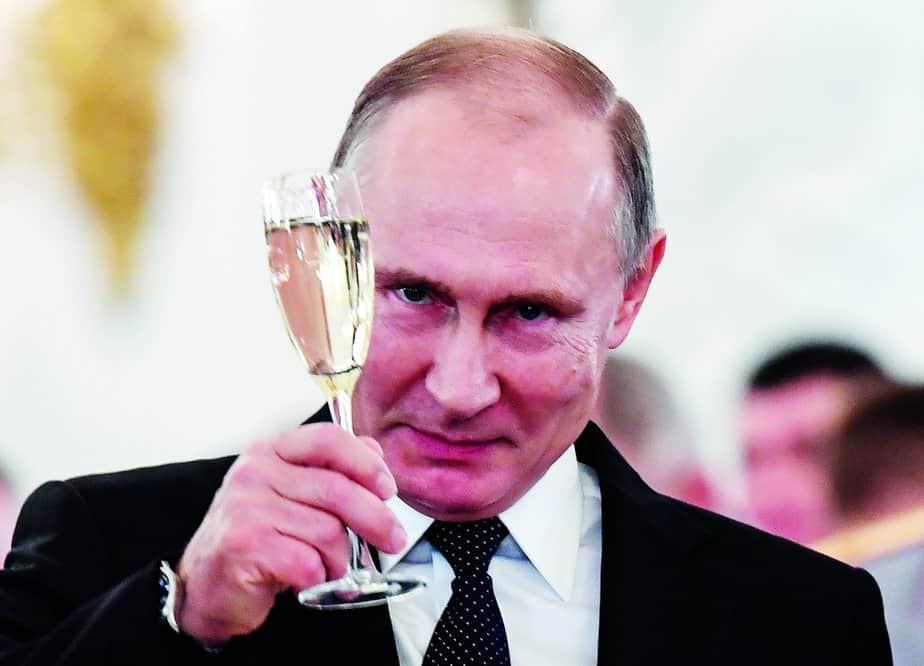
(PHOTO: AFP )
Vladimir Putin will stay president for the next six years after having won 75.9 per cent of the vote in just concluded elections. This will ensure his dominance of the world’s largest country for at least a quarter of a century — many feel he’s paving the way to be the president for life. The Western media has already declared him ‘tsar.’ In neighbouring China, the situation is not very different. Xi Jinping has removed all constitutional hurdles to ensure he’ll remains the president of China for life. The two neighbours have a lot in common, not just strong leadership. They bear a grudge against the West, particularly the US. The two together can ferment a lot of trouble and can counter-balance US hegemony.
Reverberations of the bonhomie between the two, Xi and Putin, are being felt all over the world. Last month, when Xi was elected as the president during the 13th National Party Congress, after an amendment had to be incorporated to allow him a third term, he was also selected as the chairman of the Central Military Commission. Putin was the first world leader to congratulate Xi. “This decision made by the National People’s Congress once again proves your high prestige and represents a recognition of your contribution to promoting China’s rapid economic and social development and safeguarding China’s national interests on the global stage,” Putin reportedly told Xi
The compliments were returned in full measure when Putin was re-elected as the Russian president last week. Xi wrote to Putin in his congratulatory note, “Currently, the China-Russia comprehensive strategic cooperative partnership is at the best level in history, which sets an example for building a new type of international relations,” according to the official Xinhua news agency.
Their friendship, experts say, is in their respective national interests. But many fear that it won’t be a friendship between equals. Unlike China, Russia lacks economic brawn but does have advanced military infrastructure and space capabilities which can prove handy. Kerry Brown, director of the Lau China Institute at King’s College in London, is quoted by the South China Morning Post as saying that Moscow can provide Beijing with a convenient counterweight to the West. “Sino-Russian relations are very pragmatic. But in the end China will be increasingly dominant. Longer term, China is the only power with the real ability to truly contest US dominance. And it’s already doing so. For China, Russia is a convenient power – for Russia, China is a necessary one. That’s the difference.”
This partnership between Russia and China may start another arms race between the two and the US, akin to the Cold War days. Putin in his speech just after his elections, on a conciliatory note, allays such fears, “Russia has no desire for a new arms race and will do everything it can to resolve differences with other countries, while defending its national interests.” He reiterated that Russia is for constructive dialogue with its international partners. And for constructive dialogue with Russia to progress, reciprocation is necessary, so is the respect for Russia.
Putin and his dealings suffer from a trust deficit, not that Donald Trump is any better. The western media loves to hate Putin, particularly in the US. Russian meddling in the US presidential election that made Donald Trump the president is a thorny issue; it is still under investigation. Not to forget the contentious issues pertaining to cyber intrusion, Syria and Ukraine, there are too many bones of contention. Putin likes to play these wars of perception. Recently, he informed the world about Russian ‘invisible’ weapons that can easily breach US defences. The world doesn’t know whether to take him seriously or not. During Trump’s presidency, despite his optimism of a possible thaw between the two nations, the tension between Russia and the US has been on the rise.
Time magazine did a story titled, China’s Lurch Toward One-Man Rule Under Xi Jinping Should Worry Us All. Particularly the US. Xi means business. His ‘Belt and Road’ initiative is ambitious, to foster China’s geo-political dominance. China under Xi is standing shoulder to shoulder with the US, in fact as a viable alternative. There’s a tariff war going on between the two top economies of the world, reacting to the Trump’s tariffs on China’s steel and aluminium, 10 dozen of US products in China will attract 25 per cent tariff.
China’s news agency Xinhua in a commentary published in January this year lays out the world order for the future, by offering the political and business leaders “two fundamentally different outlooks”, read two mutually exclusive options — either Xi’s “shared future” vision or that of Trump’s “America First” policy. Xinhua advised, no prizes for guessing, that Xi’s approach is a better option, for “overarching truth of today’s world: The life of different peoples and the interests of different countries have become so closely intertwined that mankind has no future but a shared one.”
Politics, war and a common enemy make strange and estranged bedfellows.
Delhi hosted what organisers describe as the world’s first player auction in golf, launching ‘72…
An elderly woman recalls how her six-year-old granddaughter lay bleeding after a speeding car hit…
Municipal Corporation of Delhi plans a unified policy enabling RWAs to adopt and maintain parks…
A 17-year-old boy allegedly died by suicide after jumping before a moving train at Uttam…
Delhi High Court grants bail to 26-year-old Thar driver accused of mowing down two in…
Two Rohini men arrested for fatally stabbing one person and injuring another during a robbery…